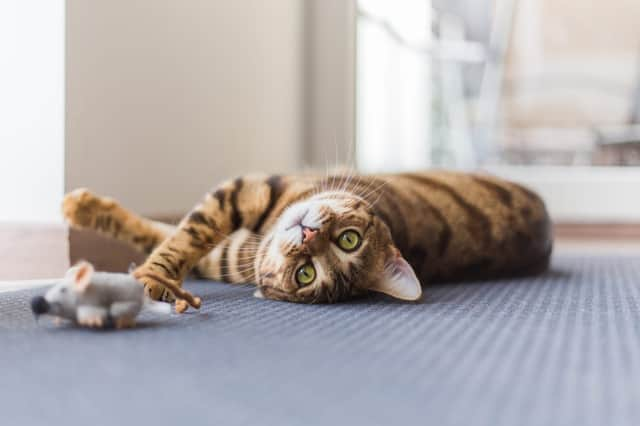Feeding your cat meaty food and playing with them may stop them killing birds - here's why


Feeding pet cats meaty food and playing with them to replicate hunting can help to stop them from killing wildlife, a new study has found.
The findings, published in the journal Current Biology, found that cats given grain-free food deposited a third fewer dead mice and birds on doorsteps, while killing was cut by a quarter with cats who were played with for just five or ten minutes with a toy mouse.
100 million animals killed per year
Advertisement
Hide AdAdvertisement
Hide AdThere have been growing concerns over the amount of wildlife being killed by pet cats, with an estimated 100 million animals killed by the population of 7.5 million cats per year in the UK.
This death toll is even higher in larger countries, with wildlife killings by cats in the billions in the US.
Two thirds of the killings in the UK are made up by mice, rats and rabbits, while a quarter are birds, including blackbirds and sparrows. The rest are made up of frogs and lizards.
The researchers, from The University of Exeter, wanted to understand the root cause behind why cats who are already well-fed go out hunting, and studied the behaviour of more than 300 cats before and after new food and/or playing was introduced.
Advertisement
Hide AdAdvertisement
Hide AdThey found that bells on collars - a common solution to wildlife-killing - made no difference to the number of animals killed by cats.
Another measure tried was puzzle balls filled with food that releases as the cats batted the balls around. This, however, increased hunting by a third, with scientists saying these cats may simply have been hungry.
Feed cats premium food
One of the most efficient measures was feeding the cats premium food in which all the proteins came from meat, with both mammal and bird hunting reduced.
Scientists said this may be because of the particular amino acids found in meat which cats specifically need in their diet.
Advertisement
Hide AdAdvertisement
Hide AdPlaying was a relatively effective measure, but only reduced the number of mammal kills and not the number of bird kills.
Researchers say this could be because the playing often took place in the evening, closer to the time when cats hunt mice and rats rather than birds, which cats often hunt in the morning.
Brightly coloured collars were also found to cut bird kills by 42 per cent but had no effect on mammal kills, again possibly due to mammal hunts taking place at night in the dark.
Prof Robbie McDonald of the University of Exeter said the result were promising for wildlife and for cat owners and shows that using entirely non-invasive, non-restrictive methods, can change a cat's behaviour.